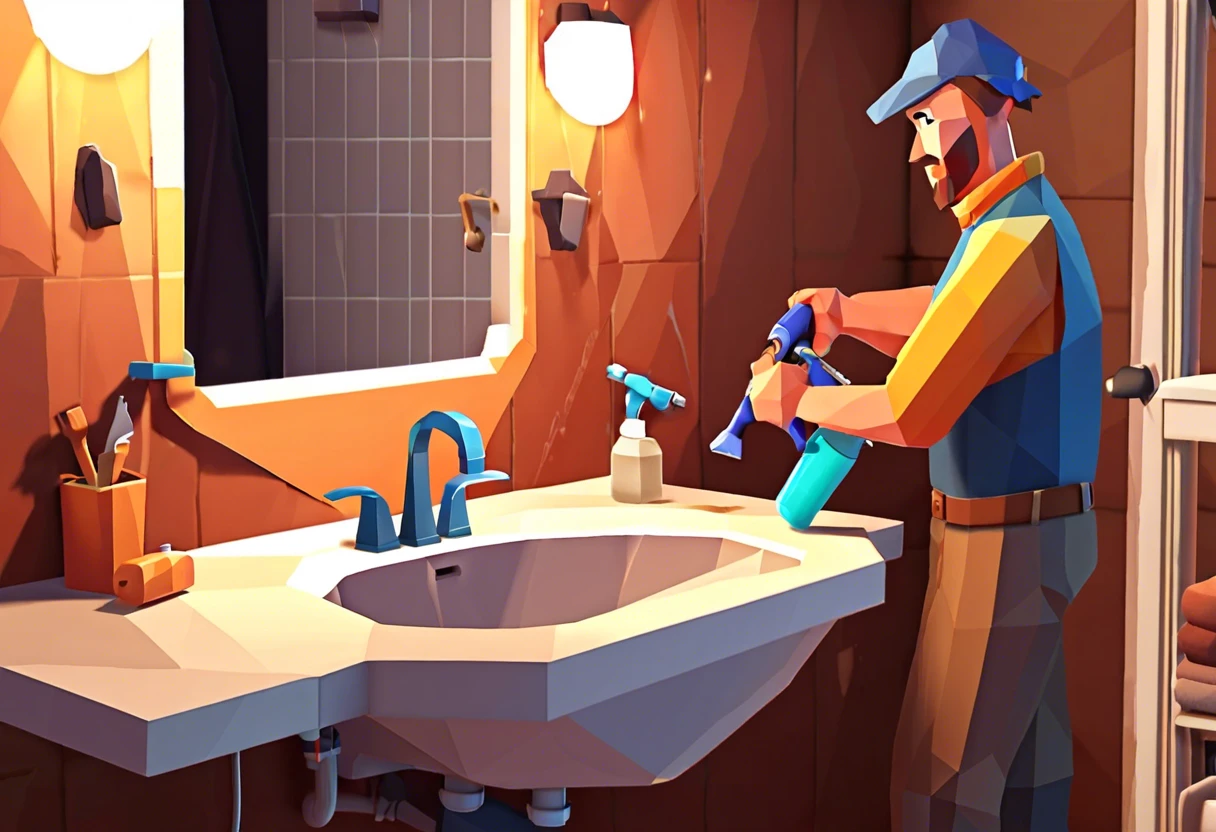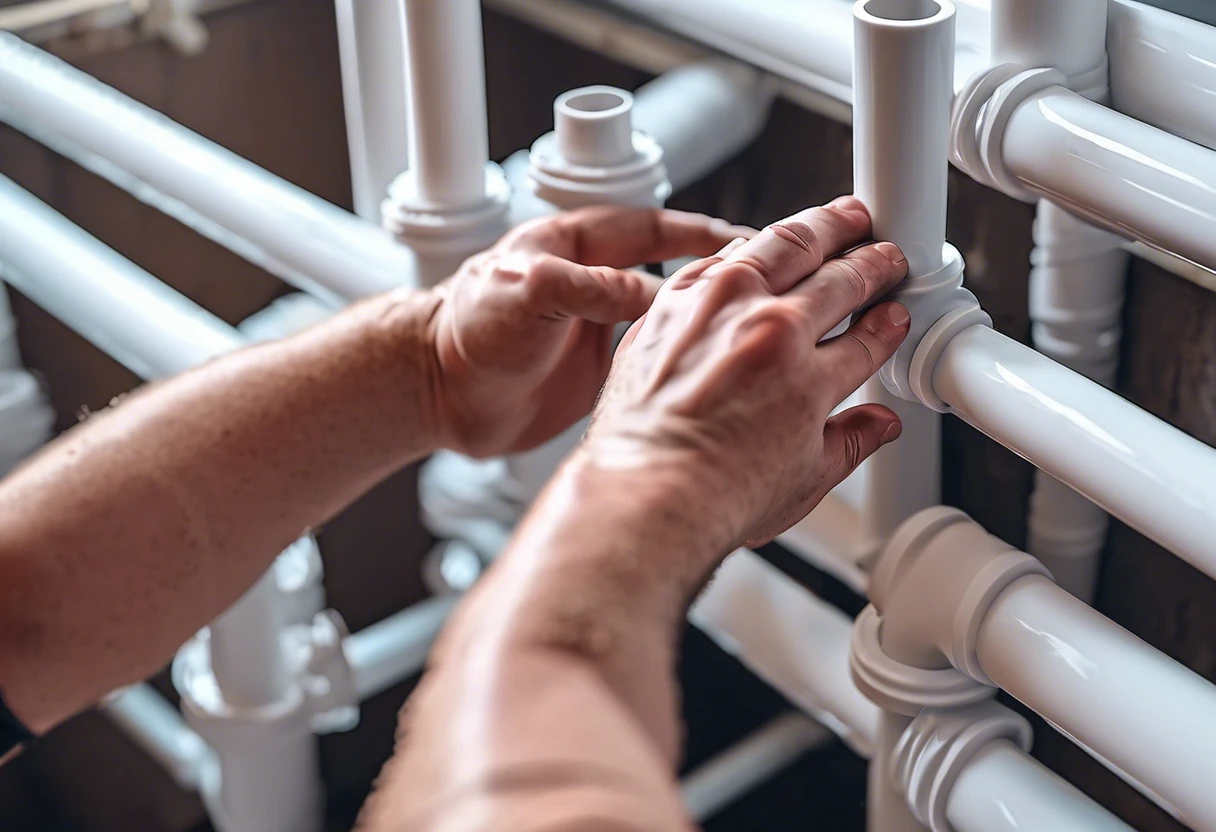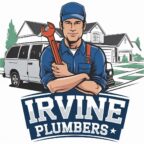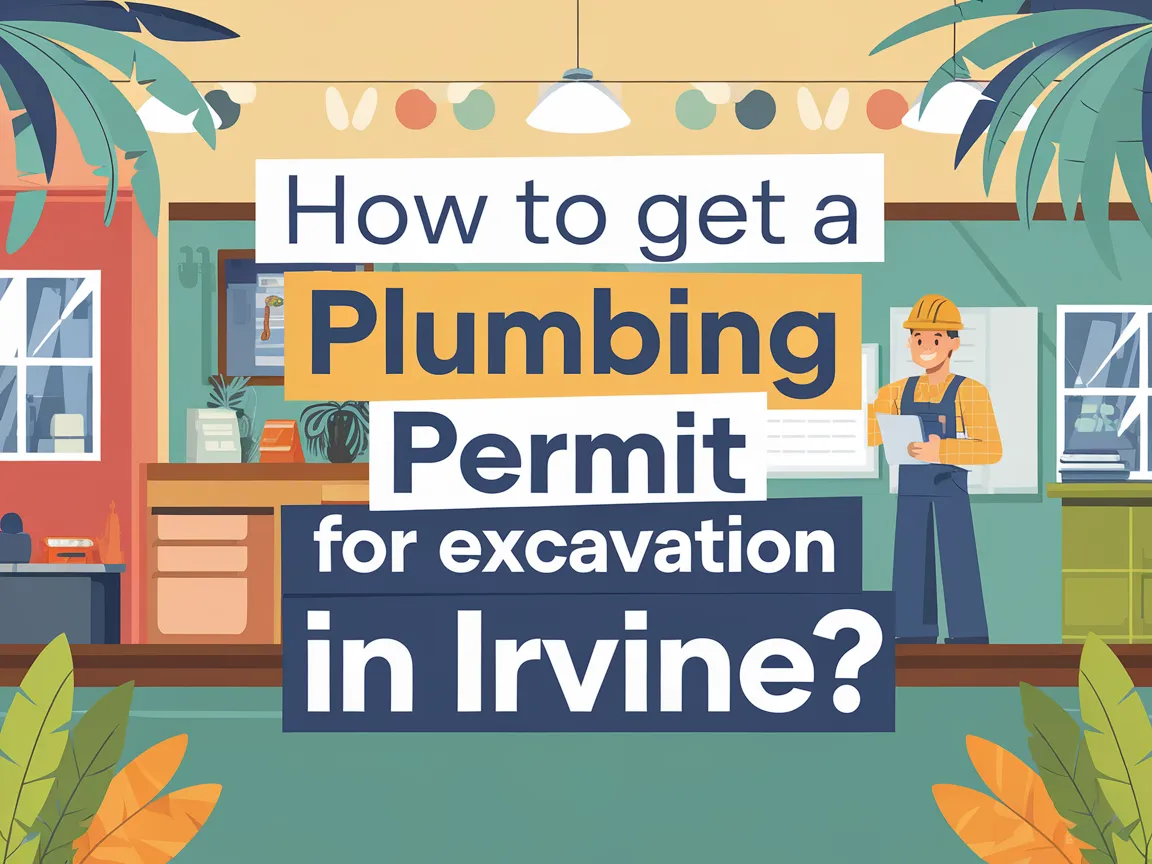Do It Yourself Plumbing?
Last Updated: February 27, 2025
What is DIY Plumbing? It’s when you fix things in your house without asking for help. Think of it like playing with toy tools, but with real stuff.
I can’t tell you how many times I’ve been asked about do it yourself plumbing in Irvine. From fixing leaky faucets to tackling clogged drains, I’ve seen it all, and I’m here to help you navigate your plumbing journey.
This guide will cover before you start your DIY plumbing project, tips for success, costs involved, factors affecting success, special considerations, when to call the pros, common Irvine plumbing problems, your basic plumbing toolbox, and emergency handling.
Table of Contents
- Do It Yourself Plumbing?
- What is ‘DIY Plumbing’?
- Before You Start Your DIY Plumbing Project
- How to Successfully Undertake DIY Plumbing Projects
- How Much Does DIY Plumbing Cost?
- What Factors Affect DIY Plumbing Success?
- Key DIY Plumbing Techniques
- Common DIY Plumbing Tips and Tricks
- Special Considerations for DIY Plumbing Projects
- Essential DIY Plumbing Regulations in Irvine
- Common DIY Plumbing Mistakes
- FAQ About DIY Plumbing in Irvine
- When to Consult With Plumbing Experts
- DIY Vs. Calling a Pro
- Your Basic Plumbing Toolbox
- Handling Plumbing Emergencies
- Got Questions? I’ve Got Answers!
- Final Words on DIY Plumbing
- Additional Resources
Do It Yourself Plumbing?
DIY plumbing is fixing or installing plumbing systems on your own, without hiring a pro. It can save you money and be rewarding. Just remember to gather the right tools and follow local codes. Don’t tackle complex issues unless you’re confident! If you’re curious about the professional path and training required, check out DIY plumbing techniques.
What is ‘DIY Plumbing’?
DIY plumbing means making plumbing repairs or installations without hiring a professional plumber. This includes fixing leaky faucets, unclogging drains, or installing water heaters. Did you know the average cost of hiring a plumber ranges from $60 to $150 (About $120 to $300 Per Hour) depending on where you live? Homeowners can save hella cash by tackling simple tasks themselves. Some complex projects might require specialized knowledge about electrical plumbing connections.
Back when I was doing routine repairs in Irvine, I used my DIY skills to replace rusty pipes and swap out toilet flappers. DIY plumbing empowers you to handle essential repairs, often using basic plumbing fixtures from your local Ace Hardware or Home Depot. Completing repairs on your own can save you not only on labor costs but also on that steep $1,500 for major plumbing fixes! When you’re ready to tackle more complex installations like pressure tanks, installing a pressure tank requires careful planning and precise technique.
Before You Start Your DIY Plumbing Project
What do you need before diving into your DIY plumbing? Let’s break it down, so you’re all set!
- Pipe Wrench: You’ll want a reliable pipe wrench, like the RIDGID 10-inch Pipe Wrench. It’s essential for gripping and turning a variety of plumbing fixtures without causing damage.
- Plumber’s Tape: Don’t forget the Teflon plumber’s tape, such as Oatey 1/2-inch tape. This prevents leaks around threaded pipe connections and is a must-have for any project.
- Adjustable Wrench: Invest in a solid adjustable wrench, like the Crescent 8-Inch Adjustable Wrench. You’ll really need this for loosening nuts and fittings with precision.
- Utility Knife: Grab an Exacto Utility Knife; it’s perfect for cutting through seals, pipes, or tubing with ease and accuracy.
- Plumbing Gloves: Don’t skip on good-quality rubber gloves, like the Firm Grip PVC Gloves. They’re necessary for protecting your hands from chemicals and grime.
You should now have a good understanding of preparing for your DIY plumbing project and necessary tools. In the next part, we’ll discuss effective methods for executing DIY plumbing tasks. If you’re concerned about potential root damage to your plumbing system, tree roots can impact underground pipes.
Also See: How to Be a Good Plumber? Master Your Craft!

How to Successfully Undertake DIY Plumbing Projects
Let’s dive into some steps that’ll help you tackle common DIY plumbing repairs like a pro right here in Irvine, CA.
-
Assess Your Plumbing Needs
First, pinpoint the issue—look for leaks, clogs, or low water pressure in your home. Use a step-by-step checklist to evaluate where you need help; visually inspecting the problem gives you greater insight.
Consider taking measurements, like pipe length or drain diameter. Remember, understanding what needs fixing first prevents confusion later on.
-
Shut Off the Water Supply
Before diving into any plumbing work, turn off the main water supply. Look for the shut-off valve, which is usually marked and located near your foundation or in your garage. If you’re unsure about the condition of your pipes, you might want to consider a professional smoke test for plumbing to detect potential hidden leaks or damages.
If you’re focusing on a specific fixture, check for localized shut-offs, like those near your kitchen or bathroom. This simple action keeps your workspace dry and manageable, saving you from unwanted spills.
-
Follow Step-by-step Instructions
Utilize detailed walkthroughs—whether from reliable plumbing websites or YouTube tutorials—to guide your actions for each type of issue. These resources can take you step-by-step through the necessary maneuvers. When dealing with stubborn clogs, you might wonder about the best chemical solutions comparing drain cleaning products.
Break down each part into bullet points to make it easier to follow. And remember, patience pays off; follow every direction thoroughly to avoid mishaps.
-
Test Your Work
Once you’ve completed the repair, it’s time to test for leaks or malfunctions. Slowly turn the water supply back on and check key areas around the repair for signs of leakage.
Run water through sinks and toilets—everything you’ve repaired or replaced should behave as expected. If there’s still an issue, double-check your connections and review your previous steps.
Pro Tip: After tackling a project, run the water after testing to catch any leaks early, keeping your plumbing stress-free!
We have now covered effective strategies for DIY plumbing projects. Next, we will discuss the costs associated with DIY plumbing.
How Much Does DIY Plumbing Cost?
So, how much should you budget for do-it-yourself plumbing in Irvine, CA? On the lower end, you could spend around $50 for minor repairs, like fixing a leaky faucet. But if you’re tackling bigger projects, prepare to drop $500 or more. Personally, I recommend budgeting at least $200–$300 for materials and tools, keeping in mind some unexpected expenses—trust me, they’ll happen. Over the years, costs have varied, but most smaller projects were doable in just a weekend! If it feels overwhelming or too intricate, professional help might save you double down the line!
Cost Breakdown Of DIY Plumbing
| Project Type | Estimated Low Cost (USD) | Estimated High Cost (USD) |
|---|---|---|
| Leaky Faucet Repair | $50 | $150 |
| Toilet Replacement | $100 | $500 |
| Short Pipe Replacement | $100 | $300 |
| Water Heater Installation | $500 | $1,500 |
| General Supplies | $50 | $200 |
So far we covered the costs associated with DIY plumbing. Let’s look at the factors that influence DIY plumbing success next.
What Factors Affect DIY Plumbing Success?
So, what factors really influence the outcome of your plumbing adventures?
-
Knowledge and Skills: Your understanding of plumbing techniques can make or break your results.
-
Quality of Tools: Having the right plumbing tools ensures your repairs are efficient and leak-free.
-
Water Pressure: High water pressure can complicate repairs and often leads to unintentional leaks.
-
Available Supplies: Access to quality plumbing supplies in Irvine can really smooth out the repair process.
We covered the factors influencing DIY plumbing success here. We will now cover essential DIY plumbing techniques.

Key DIY Plumbing Techniques
Mastering some essential plumbing techniques can take your DIY skills to the next level. Here are a few fundamental approaches every DIYer should know!
Using a Plumber’s Snake
A plumber’s snake is a flexible tool that can clear out tough clogs in drains. Here’s how to use it effectively:
- Insert the snake into the drain until you hit resistance.
- Rotate the handle to break up the clog.
- Pull the snake out carefully, taking the debris with it.
- Run hot water down the drain to ensure it’s clear.
Repairing Pipe Leaks
If you find a leak in a pipe, here’s a quick fix until you can replace it:
- Turn off the water supply to the affected area.
- Dry the pipe with a cloth.
- Wrap plumber’s tape around the leak location for a temporary seal.
- For a longer-lasting fix, apply a pipe repair clamp over the tape.
Installing a New Faucet
Here’s a quick step-by-step for installing a new kitchen or bathroom faucet:
- Turn off the water supply under the sink.
- Remove the old faucet by disconnecting the water lines and unscrewing it from the sink.
- Install the new faucet per manufacturer instructions, typically involving securing it from underneath.
- Reconnect the water lines and turn on the water supply to check for leaks.
Common DIY Plumbing Tips and Tricks
Here are some pro tips that’ll help you tackle plumbing projects like a champ:
- Always keep a bucket handy: It’s perfect for catching leaks or extra water while you work.
- Use baking soda and vinegar: This combo can help clear minor clogs and is often better than harsh chemicals.
- Label your pipes: If you’re working on your plumbing system, use colored tape or tags to label your pipes, making future repairs easier.
- Practice makes perfect: Try working on smaller projects before jumping into major replacements to build your confidence.
Special Considerations for DIY Plumbing Projects
This section covers must-know technical factors before diving into DIY plumbing.
- Know Your Plumbing Codes: In Irvine, you’ll want to start with the California Plumbing Code. Certain installations might need permits—like new drain lines or replacing major fixtures!
- Water Pressure Limits: Don’t exceed 80 psi (Pounds Per Square Inch) to avoid leaks. Use a pressure gauge to check your home’s system. Anything above 30 psi can cause major issues!
- Material Compatibility: Ensure your fittings are compatible. PVC (Polyvinyl Chloride), CPVC (Chlorinated Polyvinyl Chloride), and copper pipes don’t mix! Stick to one material for your project.
- Temperature Factors: Use pipes rated for hot water, like CPVC. Exposed areas in our OC heat can warp non-rated materials, leading to leaks or blockages. Stay ahead of the game!
- Drainage Fall: A slope of -1/4 inch (0.6 Cm) per foot for drainpipes helps with flow. Poor drainage can cause backups—you definitely don’t want a mess during fire season!
Essential DIY Plumbing Regulations in Irvine
Understanding local regulations is key to successful DIY plumbing! Let’s take a look at important standards you should be aware of before starting your project.
- California Plumbing Code: Familiarize yourself with the California Plumbing Code. It governs installations in residential structures.
- Permits Requirement: Some projects, like adding a bathroom or replacing drainage systems, need permits. Check with the City of Irvine’s planning department.
- Inspection Necessities: After certain projects, inspections may be required to ensure safety and compliance with local codes.
Common DIY Plumbing Mistakes
Are you thinking of diving into a plumbing project? Avoid these common pitfalls that new DIYers often face!
- Neglecting the Shut-off Valve: Always remember to turn off the water supply. I can’t tell you how many times I’ve seen people forget and end up with a mini swimming pool!
- Over-tightening Connections: It’s tempting to really crank down on fittings, but this can damage threads and lead to leaks.
- Ignoring Slope in Pipes: Drainage pipes need a proper slope—1/4 inch per foot. Too flat or too steep can cause serious backup issues.
- Insufficient Preparations: Rushing in without planning can lead to costly mistakes. Always plan your project out before starting.
Simple Steps for Compliance
By following some simple steps, you can ensure your DIY plumbing job stays on the right side of the law:
- Check local plumbing codes.
- Determine if a permit is needed for your project.
- Schedule any required inspections with local authorities.
FAQ About DIY Plumbing in Irvine
Got burning questions about DIY plumbing? Here are some frequently asked ones:
| Question | Answer |
|---|---|
| Can I install a new sink myself? | Yes! Just follow installation instructions carefully and ensure you’re using compatible parts. |
| Are there specific plumbing codes for water heaters? | Absolutely! You must adhere to guidelines about venting, access, and drainage. |
| What should I do if my DIY job causes a leak? | Shut off the water immediately and assess the damage. If it’s too much, call in a pro! |
| How can I tell if I need a permit? | If you’re changing existing plumbing systems or structural elements—you likely need one! |
When to Consult With Plumbing Experts
Let’s face it—sometimes, DIY plumbing just doesn’t cut it. If you’re knee-deep in a messy leak or a tricky clog that won’t budge, that’s the right time to reach out to an expert. Look for someone who’s licensed and has plenty of positive reviews, preferably from folks in the OC area. You want pros who’ve seen it all, from Irvine’s classic homes to newer builds in the Valley. When selecting a plumber, understanding the specific pipe types in Irvine homes can help you make an informed decision.
One big red flag? If they can’t give you a straightforward estimate, steer clear! I once had a project where a plumber quoted me low but then tacked on hidden fees, which was hella frustrating. So, when it comes to plumbing, trust your gut—if something feels off, keep looking! I’m stoked to help keep your home leak-free! If you’re wondering about the specific skills needed for plumbing work, professional expertise matters significantly.
DIY Vs. Calling a Pro
Now, you might be wondering whether to tackle a plumbing problem yourself or call a pro. If you’ve got a minor issue, like a slow drain, why not give DIY a try? You’ll feel like a champ fixing it!
But for major stuff—like a leaky water heater or any work involving your main pipes—it’s probably smarter to call in a licensed plumber. Trust me, the last thing you want is to accidentally flood your living room. That could literally cost you thousands! If you’re considering tackling plumbing projects on your own, it’s crucial to know your limits and learn professional plumbing techniques before diving in.
Also See: Do You Need a Plumber to Install a Sump Pump?
Your Basic Plumbing Toolbox
What tools should you have at home for those DIY days? Here’s a quick list: a wrench, a plunger, pipe tape, and a basic pipe-fitting tool. These babies can cover most of your plumbing bases without breaking the bank.
Invest roughly $100, and you’ll be set to tackle those pesky repairs without waiting for a pro to come on by. Plus, you get to learn something new along the way, which is pretty rad!
Handling Plumbing Emergencies
If you find yourself facing a plumbing emergency, the first step is to shut off the main water supply. Seriously, this is critical! It can save you heaps of headaches and cost in repairs. When dealing with complex plumbing issues, proper ventilation plays a crucial role in maintaining your system’s functionality, so you might want to explore proper plumbing vent placement.
Just picture it—water everywhere, and you’re scrambling for towels. Staying calm and quickly turning off that valve could save you thousands in damage repair. That’s how you become the plumbing hero of your Irvine home! When unexpected leaks strike, knowing your rental responsibilities becomes crucial navigating rental plumbing challenges.
Got Questions? I’ve Got Answers!
If you’ve got any more questions about plumbing in Irvine, don’t hesitate to reach out. I’m always stoked to help fellow homeowners with their plumbing puzzles. After all, we all want a hassle-free home, right?
Final Words on DIY Plumbing
You made it to the end, diving deep into the world of DIY plumbing, where we covered everything from the basics of what ‘DIY plumbing’ means, to crucial preparations before starting, the steps for successfully tackling plumbing projects, costs involved, potential factors for success, special considerations, the right moments to call in experts, common Irvine plumbing issues, the essentials for your plumbing toolbox, and how to handle any plumbing emergencies along the way.
While taking on DIY plumbing can be empowering, it’s important to recognize when to seek help. If you find yourself unsure at any point, professional plumbing services are ready to assist you.
Having reached this point, consider exploring more valuable resources and insights available at Irvine Plumbers.
Additional Resources
- Irvine Ranch Water District (IRWD) – https://www.irwd.com
- DIY Plumbing Advice Home Page
- r/DIYUK on Reddit: DIY Plumbing – How difficult?


